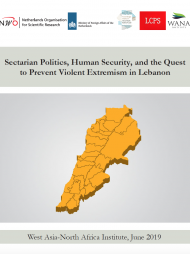-
Sectarian Politics, Human Security, and the Quest to ...
Sectarian Politics, Human Security, and the Quest to Prevent Violent Extremism in Lebanon
This Country Report presents an examination of the attitudes and perceptions in six communities across Lebanon: Baalbek; Hay el Seloum; Saida; Tripoli; Zgharta and Kfarnabrakh. Specifically, it examines how Human Security is conceptualised in these communities and it captures the local variations in its definition to produce a reconceptualisation of the term. Further, it looks into the trusted actors in human security programming, highlighting trends on how state institutions, including the security forces, are considered the key actor to enhance human security, yet, they are not always the most trusted ones to do so. In parallel, the report refers to the impact of state-centric security policies, alternatively known as “security plans” in the Lebanese context. Lastly, the report takes an eye-bird view of the data to produce a set of policy-recommendations to inform a better alignment between Human Security and long term PVE preventions.
This report is part of the regional project “Towards More Effective Human Security Approaches in the Context of the Emerging Threat of Violent Extremism in Jordan, Lebanon, and Tunisia.” Findings from the four briefs previously published on Jordan, and two on Lebanon, as well as forthcoming ones on Tunisia will feed into analytical research papers, which will be published later this year. Over the coming months, the WANA Institute will publish the remaining policy briefs on the fieldwork conducted in Tunisia, in addition to two papers: A Theory of Change and a White Policy Paper.

